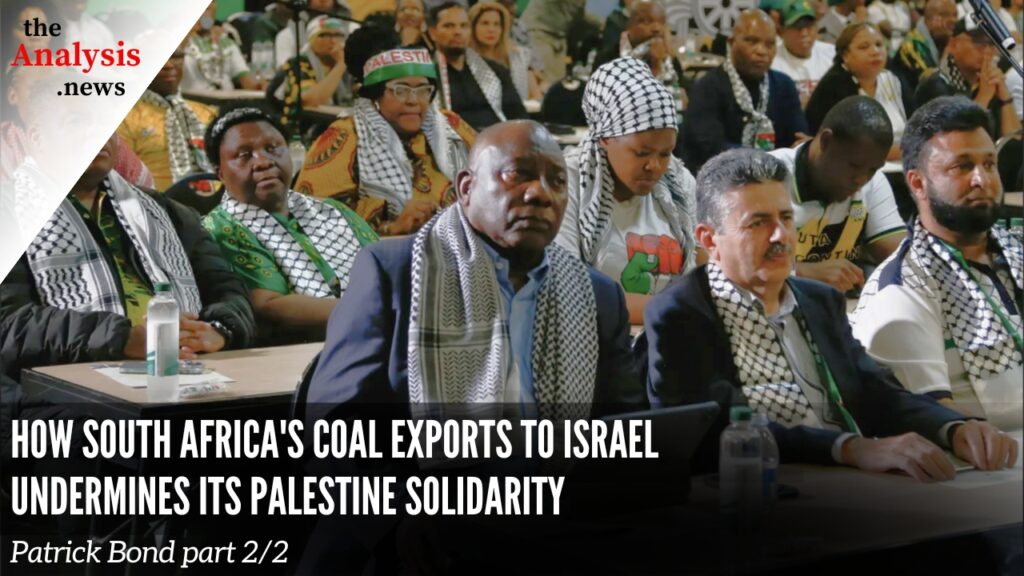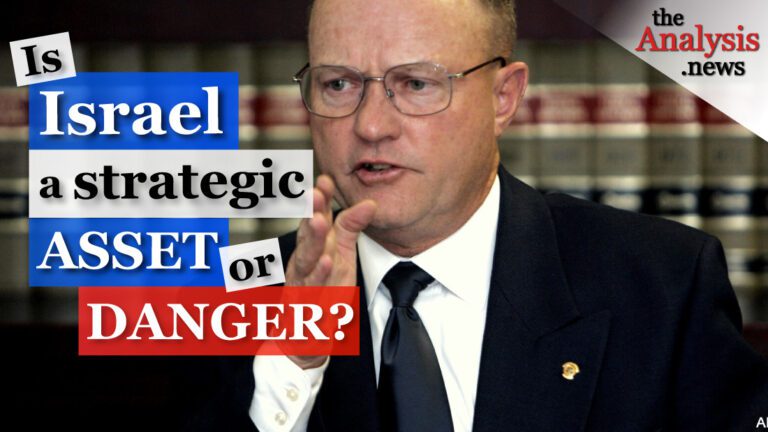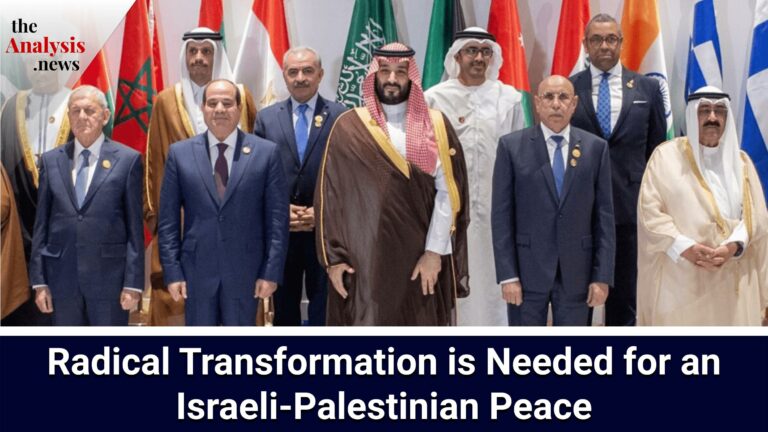Following Israel’s killing of 7 WCK aid workers, Western politicians appeared to reconsider their unwavering support of Netanyahu’s government, if only for a brief moment. Iran’s attack on military targets in Israel, in response to Israel’s strike on an Iranian diplomatic compound in Damascus, has since been cited by the U.S. and Germany as a justification for continued military support for Israel. Sari Hanafi, Professor of Sociology at the American University of Beirut, discusses Germany’s past genocidal war crimes as well as the ICJ case brought by Nicaragua examining Germany’s complicity in genocide in Gaza.
Defunding UNRWA to Starve Gaza – Sari Hanafi part 2/2
Talia Baroncelli
Hi. You’re watching theAnalysis.news, and I’m your host, Talia Baroncelli. Today, I’ll be joined by sociologist Sari Hanafi. We’ll be discussing Israel’s tactics used against the Palestinians in the Gaza Strip and West Bank, as well as the defunding of UNRWA and the conditions in which Palestinian refugees live in the refugee camps in Lebanon.
If you’d like to support the work that we do, you can go to our website, theAnalysis.news, hit the donate button at the top right corner of the screen, and make sure you’re on our mailing list; that way, you’re always up to date every time a new episode drops. Feel free to like and subscribe to the show on YouTube or on other podcast streaming services such as Apple and Spotify. See you in a bit with Sari Hanafi.
Joining me now is Dr. Sari Hanafi. He is a professor of sociology at the American University in Beirut, and he was previously the editor of Idafat: The Arab Journal of Sociology. He was also formerly the President of the International Sociological Association. He has written numerous articles on the situation of Palestinians in the refugee camps in Lebanon, as well as analyzing the various tactics used by Israel in its occupation and spacio-cide of Palestinians in the West Bank and in Gaza. He’s also written on the role of religion and religiosity in Arab societies. Thank you so much for joining me today.
Sari Hanafi
Hello, Talia. Yeah, it is a pleasure to be with you.
Talia Baroncelli
It’s great to have you. Earlier this month, we saw the Israeli military target and kill seven World Central Kitchen aid workers. Six of them were foreign nationals, and one of them was Palestinian. It’s not as if these aid workers were working without permission. This was in a deconfliction zone, so they already had permission and were collaborating with the Israeli forces on the ground to distribute this aid. The reason they were actually operating on the ground is because the Israeli military has made it near impossible for trucks to get into the Gaza Strip via a traditional crossing.
Many times, if the Israeli forces find something that they deem to be a threat, such as a pair of scissors, nail clippers, or whatever it might be, they could send the entire truck back, which is full of aid. There’s a bit of a backlog. Not that many trucks have gotten through. Then, once they actually do get into the Gaza Strip, distribution of the aid is a huge issue as the infrastructure has been completely destroyed. Many of the civilian officers who were initially responsible for distributing the aid have been killed.
In response to the killings of the World Central Kitchen aid workers, there’s a potential policy shift or change in rhetoric towards the Israelis. Yet, we do see a differentiated response when it comes to the systematic killing and murder of Palestinian civilians. The death toll is now over 33,000 Palestinians, of which at least 13,000 are children. What do you make of this differentiated response, or how would you account for this response towards Palestinian civilians versus foreign aid workers? Would you chalk it up to an internalized dehumanization of Palestinians?
Sari Hanafi
Well, I am someone who, in the past, criticized postcolonial studies, arguing that the colonial legacy is less and less influential on Western media and Western scholarship. I saw how, for instance, Arab scholars have used and abused this colonial legacy. However, I cannot help but see exactly what you said: the dehumanization of the Palestinians. Just two days before this carnage against the World Central Kitchen organization, it was killing civilians, Palestinian civilians in Gaza.
I think Yedioth Ahronoth and Haaretz, the Israeli newspapers, recognize that it was unjustified. Nevertheless, there is no reaction from the international community or media about this. I think the word dehumanization is absolutely just. I think this kind of condemnation of a human being outside of the metropolitan capitals and Western Euro-American capitals is very clear, specifically in analyzing mainstream media.
Having said that, I would say we are also surprised about how much solidarity is in these societies. The mass demonstration showed that more and more, you have a generational gap between the old elite, which still despises those who are outside the Euro-American hemisphere, and the new generation that is more sensitive about the plight, I would say, in the Global South.
I would say in Africa about the de-development produced by neoliberalism, but also about the Israeli settler colonial and apartheid practices, particularly in the last, if you like, 30 years. It’s funny when I say particularly in the last 30 years. I mean the Oslo Accords. The Oslo Accords are from 1993. It was exactly 30 years ago when the acceleration of the settler colonial project in the West Bank and Gaza began. Especially in the West Bank, where now the number of settlers increased eight times– from 100 to 10,000 to 800,000.
Talia Baroncelli
I just wanted to bring up the Haaretz report you speak about because you’re right. There were four Palestinians who were walking, and they were targeted and shot by a drone, and all four of them were killed. I think what came out of this Haaretz report was that the IDF tends to demarcate certain areas as “kill zones.” Anyone who happens to be in these areas are then designated as a threat, and they can be killed with impunity, essentially.
You bring a really good point up, and that’s the younger generations showing solidarity with Palestinians. What do you think actually drives that?
Sari Hanafi
I think simply the sense of justice. I think people do believe in the universality of human rights. Of course, this universality can be, if you like, undermined by interest sometimes, but nevertheless for young people, they don’t have a product to sell, I would say, outside their countries. They feel this injustice is on the global level in regards to the Gaza case.
The Gaza case is really… I don’t talk as a Palestinian here, but it’s a flagrant case. It’s the first time in the history of humanity that we have a graphic genocide in the making. If you don’t consider it a genocide, even massacres in the making, we see every evening on our TV the mass killing of Palestinians.
As you mentioned in the figure you mentioned, just yesterday, they discovered a mass grave next to the hospitals, 60 Palestinian bodies were there.
Talia Baroncelli
Al-Shifa hospital.
Sari Hanafi
Al-Shifa hospitals. This is outrageous. German establishments and political parties say the Holocaust is an inherent part of our identity and are defending Israel. This is the old elite, those who govern this political party. The younger German generations said, “No. What is the meaning of this?” It’s very tribal. In Arabic, there is an Arab saying that is, “You should be with your brother no matter what act he commits.” It’s a very tribal. What is the meaning?
Just last week, a German representative at the ICJ…
Talia Baroncelli
At the International Court of Justice, they were-
Sari Hanafi
Yeah, ICJ. The International Court of Justice said, “It is part of our identity to defend Israel.” But for the international community, for the UN, Israel is the occupied force. They occupied. They exercised, illegally, an occupation of over five million Palestinians. What is the meaning? We are committed to defending Israel. It means you are committed to defending the occupation.
Talia Baroncelli
In a way, they’re placing the defense of Israel, and they’re prioritizing it over their commitments to international law.
Sari Hanafi
Absolutely. Today, this morning, I read an amazing article written by a friend, an Israeli friend, Eyal Weizman, who is located at Goldsmith College in London. Eyal wrote an article about the three genocides. He connected the Holocaust with the German genocide in Namibia and the current Israeli genocide, showing that the Germans committed the Holocaust. Once you dehumanize a word you mentioned, “the other,” in Namibia, they did the same thing; it’s the same music. It’s the same cultural music. I found it really very interesting how, in this article, the three genocides have been connected.
Talia Baroncelli
Sorry if I could just give some context to the Namibian genocide. At the time, Namibia was, or what is currently known as Namibia, part of the German Southwest Africa colony, which at some point was governed by the father of Hermann Göring. The Nazi officer Hermann Göring, his father was actually one of the governors of this German Southwest Africa colony. Between the years 1904 and 1908, over 66,000 Herero and Nama people were killed and were massacred. This was a concerted effort to kill all of them, essentially, because there was what’s called a Vernichtungsbefehl, so I guess a declaration to violate the Herero and Nama people, which was put forth by Lothar von Trotha, who was one of the generals.
I think you probably remember one of the German journalists in a UN session asking Francesca Albanese if she had found any documents written by the Israelis that they wanted to “make” a genocide or wanted to commit genocide. What did this guy expect to have another Vernichtungsbefehl or another document to order or to enact the annihilation of these people? It’s kind of..
Sari Hanafi
It’s ridiculous. Exactly in the same line, just two years ago, Gambia also saw Myanmar committing atrocities and, I think, genocide against the Rohingya people. What is very interesting is that both France and Germany wanted to modify our definition of genocide to add the words implicit intention and not explicit, if you like. Because explicit, I challenge you to find even one document worldwide that is an explicit document about committing genocide, including the Holocaust, by the way.
Do you know the document about the Final Solution? We call it the Final Solution. But if you read the document, the minutes of this meeting, the famous meeting with Hitler, you can conclude that there is a decision of eliminating all the Jews. But in fact, the fact is stronger than anything else. This is why we consider the Holocaust an absolute, deliberate, intentional elimination of Jews.
It’s funny that they pushed to change at the Genocide Convention the international law concerning genocide. Now, they claim and say, “We don’t have evidence.” It’s not sufficient that the President of Israel, [Isaac] Herzog, said that “there is not one single innocent [civilian] in Gaza.” It means that everyone is complicit in what happened on October 7.
Talia Baroncelli
Yeah, I think he said there are no uninvolved civilians or something like that. Everyone, according to him, would be involved or complicit in the Hamas attacks on Israel on October 7, is his insinuation.
Sari Hanafi
Exactly. I talk with a lot of French colleagues, myself, I’m also French. Sometimes, I have doubts about whether I am exaggerating why it’s unbelievable. We live in an insane time. I know French people who are not connected at all to Palestine, Israel, and the Middle East. They are as outraged as me to feel like this is unbelievable. How do you keep lying to yourself? What is the interest? How do Macron and others think that [supporting] these lobbies, arm lobby and pro-Israeli lobby, will help them to be re-elected? They are very selfish politicians or, if you like, politicking, what we sometimes call politics. This is horrible. This is why the young people in the streets are outraged.
Now, the problem, and I’m talking here as a sociologist of the social movement, is that as far as the young people on the streets, they are not connected to classical political parties. It’s very difficult to envision a liberation of political change. You need to do this. Personally, I have observed the Green Party, the German Green Party, for a long time, and I know how much of this ecological thought has been driven by young generations from below.
Unfortunately, I don’t find this leverage today. I know that some of the green activists in Germany used to be active in these political parties. They left the political parties. You see, this is where you have a reason sometimes to leave these classical political parties, and then you don’t have political leverage. This is the dilemma that we live in today.
Talia Baroncelli
Would you say that your colleagues and friends who left the Green Party or traditional political parties left because they thought they could perhaps enact change from the outside, from being an activist in other non-state organizations or not being affiliated with the state in any way?
Sari Hanafi
Well, in Europe, if you like, in a liberal democracy flows left and right, and the role of lobbies. Lobbies are more and more important. Neoliberal capitalism and how the market is manipulating politics, social life, and emotional capital. Taking into account all of this, I would say you can be in a political party and play the dissident to a certain extent.
We saw, for instance, for a long time in the socialist party in France how it was gathering different groups where they didn’t have a main issue. They have so much divergence about some of the files, economic files, sometimes political files, and so on. I think they are mistaken, those who leave the political parties, as they think that doing it only at the street level is sufficient.
I am talking as an Arab scholar where I see the mitigated; I don’t want to use a stronger word like a failure of Arab Spring, a mitigated effect of what happened in the last decade, where this Leninist leaderless movement had not succeeded in political change, a democratic transition I mean. You need to play the two levels: the street levels and the informal mobilization. At a certain point, it’s very important to frame this into a political structure where this political structure can really have decision-making leverage.
Talia Baroncelli
You’ve just been watching part one of my discussion with Sari Hanafi. Join us for part two, where we’ll address the defunding of UNRWA and the role that UNRWA has played over the decades. We’ll also be speaking about Palestinian refugee camps in Lebanon and how the conditions there have changed over the years. Thanks for watching.
Podcast: Play in new window | Download | Embed
Subscribe Apple Podcasts | Spotify | Android | iHeartRadio | Blubrry | TuneIn | Deezer | RSS
Never miss another story
Subscribe to theAnalysis.news – Newsletter
Sari Hanafi is currently a professor of sociology at the American University of Beirut and chair of the Islamic Studies program. He is the president of the International Sociological Association and also the editor of Idafat: the Arab Journal of Sociology.


















